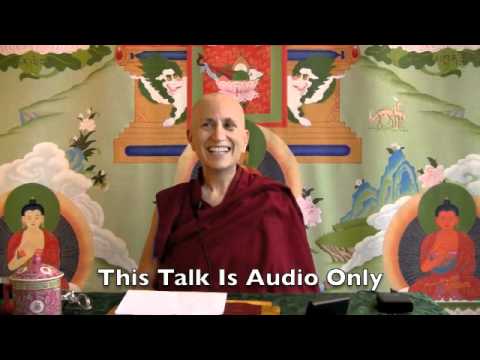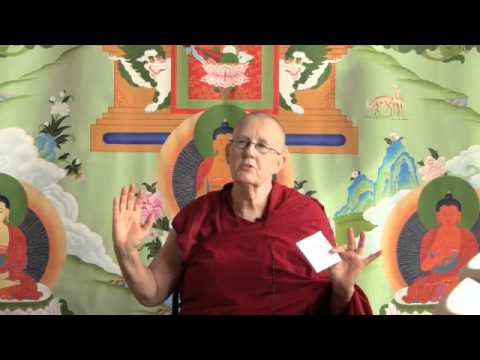Being a friend to yourself
Part of a series of teachings given at the Winter Retreat from December 2011 to March 2012 at Sravasti Abbey.
- The importance of caring for yourself
- How being a friend to yourself is connected to bodhicitta and cherishing others
Vajrasattva 03: Motivations—Friends to ourselves, bodhicitta for others (download)
This is the beginning of the Vajrasattva retreat series of talks by the nuns and Zopa of Sravasti Abbey for the next few weeks. I was asked to talk on motivation and I’ve had quite a few thoughts about this the past few days. First of all is to realize that motivation is the keystone in determining whether our actions are beneficial or not in the present. Our motivations also determine whether what we are going to experience in the future is going to be suffering or happiness. That’s kind of the fundamental characteristic of motivations.
I was thinking about all of us here. I’ve had this sort of pride and joy in my mind in the past few days because I think that, whatever motivations folks decided on why they want to do the retreat here, they must have been extremely heartfelt, extremely focused, and committed and virtuous motivations. Just getting our lives together in order to get here, if that motivation is not sincere and well-grounded in virtuous mind, the obstacles that can arise would certainly detour us. There’s been this kind of thing that’s come up in my mind the past few days and how proud I am of all of us and how we got here.
Yesterday, Venerable Chodron set out this invitation (which I also see as a motivation) during the retreat to set the intention to make friends with ourselves. At first it sounds fun, easy, and pretty simple. But I have found, at least in my own experience in the past few years that I’ve done retreat, that it is probably the most profound teaching that Venerable gives. It encompasses the entire gradual path. For the most part I didn’t have any idea how to be a friend to myself before I started doing these retreats. Part of the confusion is that the self-centered thought loves to be my friend and that it has all sorts of ideas on what being a good friend to Semkye really is about. That added to the confusion on how to truly be a virtuous friend to my own mind. Over the past years that I’ve been doing retreat I’ve been starting to clear myself of that confusion. But what’s replacing it is confusion, or maybe a disconnect, about how becoming a good friend to oneself has anything to do with bodhicitta?
Part of the reason for my confusion or the disconnect is that when I am really in the thick of things, what I am trying to determine in my mind is what’s crazy thinking, what’s downright lies to myself, and what are some insights and truths that I really need to hold on to. Or times that I have to spend being so vigilant, so I can catch the afflictions before they arise (before they put a ring through my nose and run me around the Abbey for three days). Or, time that I have to grow as a good friend to myself to learn to be self-accepting, to be able to recognize and respect my own basic goodness. This is not an easy task for many of us, myself included.
Being a good friend to Semkye is a fulltime job. She’s continually getting herself into trouble in all sorts of ways. While I’m doing this, taking care of myself and understanding what a good friend is, I have to be honest and say benefitting others and becoming a Buddha is not in my purview. So then I was thinking, “What does this have to do with it?” Here’s my motivation to be a friend to myself in the most virtuous way and then benefitting others and wanting to be a Buddha. I couldn’t get the connection because of the time involved in being a good friend to myself. But then I had this kind of epiphany the other day, or at least a clarity that being a friend to oneself and generating bodhicitta are absolutely connected to each other. They’re inseparable.
The understanding that I am coming to is that until I can discern, or until we can discern, what it is that is not helpful, maybe harmful, and downright dangerous to our minds… You know, the self-centered thought, this grasping at this “I” that is the most important thing in the universe—that is so bristling and sensitive and full of itself, and all the negative mental habits that proliferate to support these. Until we can identify that and work on finally letting that go, and until we can discover, respect, and acknowledge our own goodness and the things that are worth keeping, bodhicitta will be nothing more than an idea. How would one be able to respect, affirm, support, care for others when we have no clue how to do that for ourselves? It’s like a person who is unable to see leading others who are also visually impaired.
The beauty of retreat, and the beauty of Venerable Chodron’s invitation as one of our basic motivations is as we become friends with ourselves. This is a very intimate one-on-one relationship with everything (the good, the bad, and the ugly); and that the one-on-one relationship starts to turn into a circle. This is something that’s finally becoming a little bit clearer to me because I’m able to see my own suffering. I see your suffering. I see, respect, and acknowledge my own goodness. Then I can see and appreciate and acknowledge your goodness.
The making friends with oneself: Venerable Chodron really took that cherishing out of self-cherishing and really gave it the virtuous quality that it has. [Ven. Chodron doesn’t use the term “self-cherishing thought” but rather “self-centered thought.”] Being a friend to ourselves is truly cherishing us in the most heartfelt way. By becoming friends with ourselves the cherishing of others (because we’re connected, we understand there’s a simpatico) becomes sort of this dance. It becomes this activity of the cherishing of oneself and the cherishing of others.
Then seeing those things within ourselves and then acknowledging them in others: this whole idea about seeing others in beauty and seeing them as our mothers who have been so kind to us in previous lives. Then it doesn’t seem like this intellectual Rubik’s cube. They’re not disconnected anymore. And then this idea of, if I really want to be the best friend to others, awakening is the only way to do it.
You know I’ve shot myself in the foot and I’ve had things blow up in my face in my unskillful ways to be a good friend to others. Learning that the reality of it is being a Buddha is the best friend that we can be to each other. And so, the motivation of coming into the retreat to make friends with ourselves and doing retreat to generate and grow our bodhicitta are very much interconnected. In fact they’re very good friends. This is one of the things that I’ve been working on for years: I see the pieces and they’re not separate.
I want to invite all of you over the next days to take Venerable Chodron’s deep-hearted invitation. It’s a profound invitation to make friends with ourselves in the next weeks and see what happens to your bodhicitta.
Venerable Thubten Semkye
Ven. Semkye was the Abbey's first lay resident, coming to help Venerable Chodron with the gardens and land management in the spring of 2004. She became the Abbey's third nun in 2007 and received bhikshuni ordination in Taiwan in 2010. She met Venerable Chodron at the Dharma Friendship Foundation in Seattle in 1996. She took refuge in 1999. When the land was acquired for the Abbey in 2003, Ven. Semye coordinated volunteers for the initial move-in and early remodeling. A founder of Friends of Sravasti Abbey, she accepted the position of chairperson to provide the Four Requisites for the monastic community. Realizing that was a difficult task to do from 350 miles away, she moved to the Abbey in spring of 2004. Although she didn't originally see ordination in her future, after the 2006 Chenrezig retreat when she spent half of her meditation time reflecting on death and impermanence, Ven. Semkye realized that ordaining would be the wisest, most compassionate use of her life. View pictures of her ordination. Ven. Semkye draws on her extensive experience in landscaping and horticulture to manage the Abbey's forests and gardens. She oversees "Offering Volunteer Service Weekends" during which volunteers help with construction, gardening, and forest stewardship.


